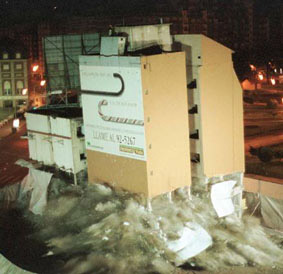Purchasing Managers' Index: Rubalzapiana Spain is "kaput" ...

Purchasing Managers' Index: Rubalzapiana Spain is "kaput" ...
17/08/2011 19:35 A. Anchuel
Evidence is accumulating that our country may be about to suffer a relapse in the downturn. If such a thing happen, would lead to dramatic consequences. Government revenues are tied to economic activity and suffer. Lower income than anticipated would force more drastic cuts in public spending to meet the deficit target. These effects, to be serious, would be only the most immediate.
They would join the strengthening of the perception that Spain is on track to reduce its high debt problems of private and public in terms of GDP by growing it. The situation of the banks also worsen, the prospects of default deteriorate and the value of the Spanish public debt accumulated in their balance sheets. This in turn unleashed the fear of an abrupt increase in debt, with the greatest needs to recapitalize banks. Therefore, the issue of a possible relapse into recession, however slight or temporary it might be, is not trivial.
The alarm light that is kindled more strongly was that of the Purchasing Managers Index (Purchasing Managers' Index - PMI). This is a monthly indicator developed by surveying the leading private companies in manufacturing and services. Their results are very accurately anticipate the behavior of GDP. Recent data for July are very striking.
An index value of 50 means that production is expected to vary, higher values indicate lower growth and contraction. The value for Spain in July of 46'1 was the lowest for 19 months, which warns of the danger of recession. For all the euro area, the index is 51'1. This is the lowest in 22 months and indicates the stagnation of production, after four months of significant declines. Values for Germany (52'5) and France (53'2) do expect a slowdown in growth, they are in minimum of 21 and 23 months respectively. Italy's third largest economy in the eurozone, also suffers risk of relapse into recession, with an index of 49.1.
It can be argued that this indicator is not infallible (none is), but their results do not contradict the most elementary common sense. There are already credible reports of the behavior of the Spanish economy in the first half of 2011. The more complete the quarterly report of the Bank of Spain. The picture presented is that of a stagnant economy, which grows only minimally due to the external sector. In the second quarter, activity has weakened further.
The GDP has registered a variation of 0.2% QoQ, which reduces the annual rate to 0.7%. This result is the sum of a national demand fell by 1.9% (stronger than in the first quarter) and net external demand which increases its positive contribution to the 2.6 points. Translated into Castilian: the only thing that lets the Spanish economy minimally head hovering above the recession is the pull outside. This is based on the growth of our neighbors and the good performance of tourism (helped by the instability in North Africa).
Moreover, all major problems are still alive. The adjustment of the construction is not finished. Continue to fall as sector employment as the apparent consumption of cement, recorded purchases and the price of housing (a one year rate of 5,2% in April-June period). The private sector deleveraging has barely started. The ratio of household debt has fallen slightly since the beginning of the crisis (see Figure 24 on page 66), and the current context is the decline in the value of household wealth. This will weigh on consumption. For example, registrations of passenger cars between April and June fell 35%, three points higher than in the first quarter. The drought of credit to households and businesses is maintained (as stated in the figure 4 on page 16).
Now consider the effects they may have on this economy, almost stagnant during the first half, the latest developments. Recently, the sovereign debt crisis has hit full in Spain. So much so that our economy is now in the ICU. Only sustained artificially assisted respiration by the ECB, which provides liquidity to the Spanish financial institutions (for which markets are closed) and buy Spanish public debt in the secondary market. The negative impact of these events are broadcast on various channels.
The conditions of access to finance by households and firms will experience a further tightening. Do not forget that national needs for external financing remain net 4% of GDP. The confidence of consumers and businesses will suffer. The need for further fiscal consolidation plans also adversely affect domestic demand.
To top this crisis of Spanish sovereign debt occurs in a broader context of international economic slowdown, which we announced in an article in early June. Some neighboring countries (Portugal, Italy and France) are being affected by the debt crisis and had to implement further cuts. These countries with growing problems are the main destinations for our exports, which will be affected accordingly. The 8.9% of Spanish exports goes to Portugal, 8.8% to 18.3% Italy and France.
Meanwhile, the PSOE is fully immersed in an election campaign that sells the message that economic recovery has already occurred (because of its policies), it remains to consolidate and that allows the candidate to promise little joys RbCb so far were not possible. But these people what world you live? The truth is that the crisis continues roaring and Spanish society is still not psychologically prepared to make front. Nobody has ever said from the various authorities the truth about what is happening or how to fix it.
0 comentarios